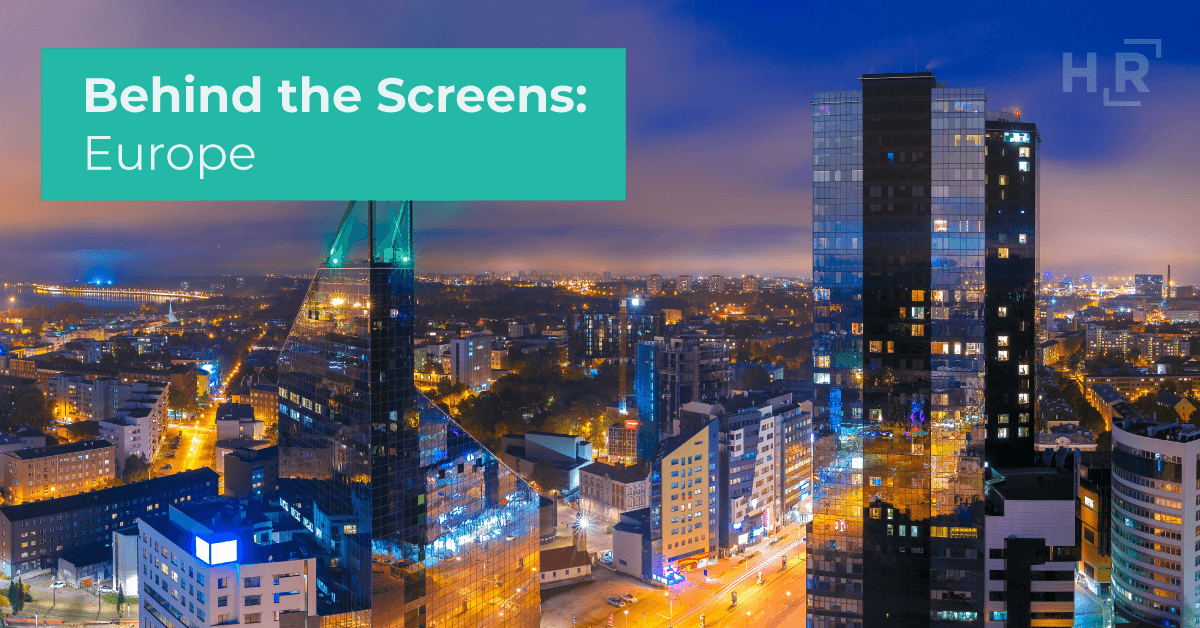Behind the Screens: Unmasking Background Screening in Europe
In this blog post, Peter Cleverton, Managing Director of EMEA at HireRight, answers some questions about screening in Europe, from where, and in which industries, it is most common, to some of the challenges you may face when screening in-region, as well as providing three tips for companies looking to start screening in Europe.

This blog was originally published by Unleash on December 21, 2021.
Many businesses in Europe may still be unfamiliar with background screening. With HR professionals and hiring managers alike possibly never having been through the screening process themselves, it’s no surprise there may be a few knowledge gaps about our industry. In this blog post, I’ll be answering some questions about screening in Europe, from where, and in which industries, it is most common, to some of the challenges you may face when screening in-region, as well as providing three tips for companies looking to start screening in Europe.
Where is screening most common in Europe?
The UK has long been the central hub of background screening within Europe and the broader EMEA region, with awareness of screening and its uptake at the highest levels within the region. If we look at where our customers are screening the greatest volumes of candidates, it is usually where they have large outsourcing centres in Europe, such as in Poland, Hungary, Romania, and Ireland. In addition, we have been seeing that in the Benelux region (Belgium, Netherlands, and Luxembourg), as well as in France and Germany, many companies have been starting to look at their screening programmes more holistically.
However, there are some countries in the region where businesses may find background screening a little more difficult to introduce. This could be due to a number of factors such as works councils or complex local compliance impacting which checks are permissible. Additionally, in certain countries, background screening is something that is still slightly frowned upon, and it can be a challenge to get large European organisations to look at screening as a wholesale activity. Many businesses in the UK understand this approach, and certain other countries are buying into it, but we don’t yet broadly see a top-to-tail “let’s screen everybody who comes onboard” attitude to background screening in the region.
Which industries are the most familiar with screening in the region?
In Europe, financial services and technology companies have long been leading the way when it comes to the adoption of pre-employment screening. However, in the last 18 months to two years, we’ve been seeing more life sciences and pharmaceuticals companies aligning their screening programmes internally, looking at a global landscape rather than being more country-specific.
It’s also been amazing how much we’ve seen new start-ups – particularly those in FinTech, new technology businesses, and “unicorns” (privately held businesses valued at over $1bn) – really experiencing the benefits of screening and adopting it as a part of their onboarding strategies to help safeguard their businesses for the future.
Has screening awareness and the appetite for it in the region changed in recent years?
Over the last five to ten years, the profile of background screening in Europe has risen significantly. When I first started working for HireRight, around seven years ago, and I told people what the company did, I’d say maybe one out of a hundred people knew what pre-employment screening was; that’s probably nearer 50% now. More and more organisations are starting to adopt it because they see the value in it. Even more so now, where there’s a war on talent, you want to make sure you get the right talent through the door.
What challenges may businesses face when screening in Europe?
Awareness and acceptance of background screening vary widely from country to country and industry to industry, which can make it difficult to quickly implement a regionwide screening policy. From a legal perspective, there is also a lot to consider when screening in different countries, as each territory will have its own laws, which may impact the types of checks that can be conducted as part of the screening process or the scope of those checks.
Additionally, internal alignment within the organisation can be a stumbling block to rolling out global screening programmes. Typically, it is the security, fraud, and risk teams or the HR departments that want to roll out screening globally and who want to have a uniform approach. However, if this is attempted without getting the buy-in from the different regional stakeholders, this process can be very time-consuming, for both the screening provider and the business.
What should businesses consider when starting screening in Europe?
Secure in-region buy-in – particularly in countries like Germany where they have a works council. Make sure that you work with them upfront, rather than bringing them in at the end of the process, so they can understand how the screening provider works and how they can partner with them to roll out a successful screening programme.
Ensure hiring managers are aware of the screening process, as this will impact their time-to-hire. Where they may have previously had a 4-6-week turnaround time from listing a vacancy to the new hire’s first day, background screening in EMEA requires up to 10 working days to complete, which needs to be incorporated into their onboarding timescales.
Educate your candidates on the screening process. It can be a daunting experience going through the screening process, especially if the candidate has not been screened before. Being transparent about what the screening provider actually does, what information they will be checking, and what they won’t, will go a long way to reassuring candidates.
To find out more about background screening in EMEA, get in touch.
About HireRight in EMEA
The EMEA team is made up of around 750 employees, split between our offices in London (UK), Katowice (Poland), Tallinn (Estonia), and Dubai (UAE). Each office, and the team members usually based from it, has something different to contribute to the business in the region.
Release Date: January 26, 2022
